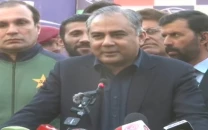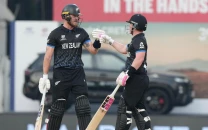Cannot deny Asif, Salman and Amir a second chance: Justice Qayyum
Justice Qayyum was in charge of inquiry into match-fixing scandal surrounding Pakistan cricket between 1998 and 2000

ICC banned the three players for different periods. PHOTOS: AFP
Read: Pakistan cricket fraternity not as forgiving as ICC
Justice (retd) Malik Qayyum told the Press Trust of India that since the players have done the time for their crime and have also been cleared by the ICC, they were entitled to redeem themselves by playing again.
"I know there is a strong opinion that to set the right example against corruption in cricket, the Pakistan Cricket Board (PCB) should never select these three in the national side again," said Qayyum.
Read: I will let the ball do the talking for me: Muhammad Asif
"Ethically, if you look at this case it is another thing but in legal terms and keeping with fair justice, you cannot deny them a second chance," he said.
Justice Qayyum was in charge of an approximately 18-month long inquiry into the match-fixing scandal surrounding Pakistan cricket between 1998 and 2000. He was also the man who recommended life bans on former Pakistan captain Salim Malik and pacer Ataur Rehman while imposing fines ranging from half a million to Rs100,000 on six other players including current Pakistan head coach Waqar Younis and bowling coach Mushtaq Ahmed.
The retired judge said that since his rulings were not binding on the government, not all his recommendations were applied in their entirety.
"Maybe if they had enforced some of my important recommendations, the spot-fixing scandal or the Danish Kaneria case would not have taken place in England," said Justice Qayyum, who belongs to a bench of the Lahore High Court.
He also expressed his displeasure with some of the accused players being granted managerial roles.
"Perhaps these players have atoned for their sins as even our religion allows forgiveness. But, I had also recommended that before a player comes into the Pakistan team all his assets should be checked by the board and also after every series, but this too was not implemented," he stated.
Justice Qayyum insisted that changes need to be made in the Constitution of Pakistan to deal with the corruption that takes place in the sport. He also said that the Board should treat corruption cases in cricket as criminal acts and special laws should exist to indict the guilty.
"Until this is done, we might see a repeat of corruption scandals. Because if I recall at least six Pakistan managers and four or five captains admitted during the judicial inquiry that yes match fixing had taken place in Pakistan cricket," he said.
The justice further said that taking action against players is becoming increasingly difficult ever since some officials who had previously pledged support for the cause had backed out.
"I was very upset with Ataur Rehman for lying before the commission and committing perjury, that is why I recommended a life ban on him but he is also active now in cricket as a coach.
"I recommended a ban on Malik because I found substantial evidence to show his involvement in fixing while the players were fined for not cooperating with the judicial inquiry," said Justice Qayyum.
Interestingly, Ijaz Butt, who was the chairman of PCB when spot-fixing allegations enveloped the board in 2010 during a series with England, shared Justice Qayyum’s views regarding giving the players another chance.
"The punishments they got were deserved. Especially Salman Butt. He was mainly responsible for all that had happened. But once the ICC has also ended their bans than it would not be fair to stop them from trying to earn a place in domestic or international cricket," Ijaz Butt said.



















COMMENTS
Comments are moderated and generally will be posted if they are on-topic and not abusive.
For more information, please see our Comments FAQ